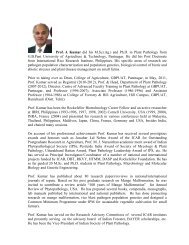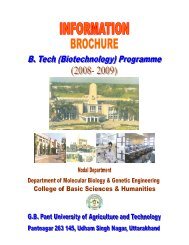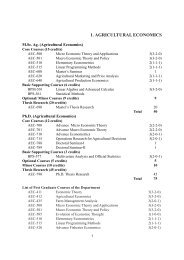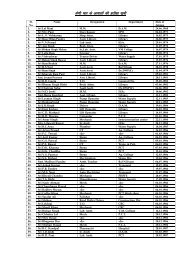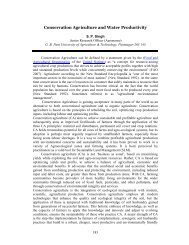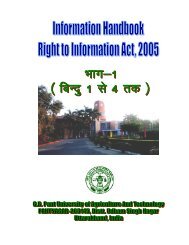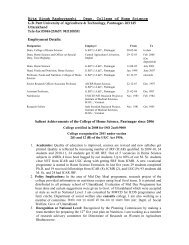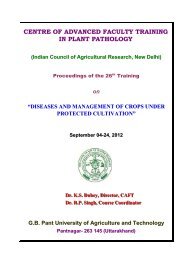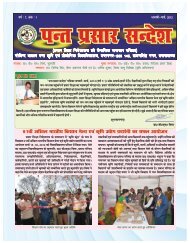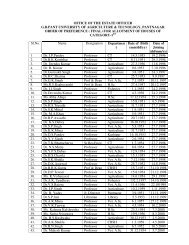Seed Health Management for Better Productivity - Govind Ballabh ...
Seed Health Management for Better Productivity - Govind Ballabh ...
Seed Health Management for Better Productivity - Govind Ballabh ...
Create successful ePaper yourself
Turn your PDF publications into a flip-book with our unique Google optimized e-Paper software.
(<strong>Seed</strong> <strong>Health</strong> <strong>Management</strong> <strong>for</strong> <strong>Better</strong> <strong>Productivity</strong>)inhibits the barnase RNAse in barnase-bar/barstar plants. This male sterility/fertility system has showncommercial promise in maize and oilseed rape and can be easily extended to other crop species.<strong>Seed</strong>s as target <strong>for</strong> molecular farming:One of the emerging fields of plant biotechnology, referred to as “Molecular Farming”, hasbeen used in recent years to produce value-added products <strong>for</strong> nutraceuticals, pharmaceuticals,and other industrial applications. Molecular farming is defined as the production of proteins orother metabolites valuable to medicine or industry in plants traditionally used in an agriculturalsetting. The concept of using plants as hosts <strong>for</strong> the production of valuable proteins has beencalled "molecular farming". A wide range of pharmacologically interesting proteins can beexpressed in diverse plant organs and seeds can be one important host. This has as anadvantage that these transgenic seeds harboring the protein of interest can be stored in the drystate <strong>for</strong> a long time and the integrity of the pharmacologically interesting protein is kept. Modifiedseeds storage proteins and modified oleosin proteins have been used <strong>for</strong> this purpose.The accumulation of recombinant antibodies in seeds allows long-term storage at ambienttemperatures because the proteins amass in a stable <strong>for</strong>m. <strong>Seed</strong>s have the appropriatebiochemical environment <strong>for</strong> protein accumulation, and achieve this through the creation ofspecialized storage compartments, such as protein bodies and storage vacuoles, which arederived from the secretory pathway. <strong>Seed</strong>s are also desiccated, which reduces the exposure ofstored proteins to non enzymatic hydrolysis and protease degradation. Cereal seeds also lack thephenolic substances that are present in tobacco leaves, so increasing the efficiency ofdownstream processing. Maize is now the main commercial production crop <strong>for</strong> recombinantproteins, which reflects advantages such as high biomass yield, ease of trans<strong>for</strong>mation and in vitromanipulation, and ease of scale-up. Maize is also being used <strong>for</strong> the production of recombinantantibodies and further technical/pharmaceutical enzymes, such as laccase, trypsin and aprotinin.The use of barley grains as bioreactors <strong>for</strong> highly active and thermo-tolerant hybrid cellulase (1,4-ßglucanase) was investigated .Alfalfa and soybean produce lower amounts of leaf biomass than tobacco, but have theadvantage of using atmospheric nitrogen through nitrogen fixation, thereby reducing the need <strong>for</strong>chemical inputs. Both species have been used to produce recombinant antibodies. Pea is beingdeveloped as a production system, although at present the yields that are possible with thisspecies are low.<strong>Seed</strong> storage proteins as target <strong>for</strong> nutritional quality improvements anddevelopment of nutraceuticalsIn general, cereal seed storage proteins are low in lysine and tryptophan while legumes aredeficient in the sulfur containing amino acids, methionine and cysteine and hence can beconsidered as nutritionally poor. Biotechnological approach <strong>for</strong> improving seed storage proteinquality can be i) protein sequence modification ii) synthetic genes iii) overexpression ofhomologous genes and iv) Transfer and expression of heterologous genes. In order to establishragi as nutraceutical crop, value added products <strong>for</strong> diabetics, pregnant women and children in the<strong>for</strong>m of breakfast and meals can be prepared based on the scientific rationale explored in our lab.- 194 -




